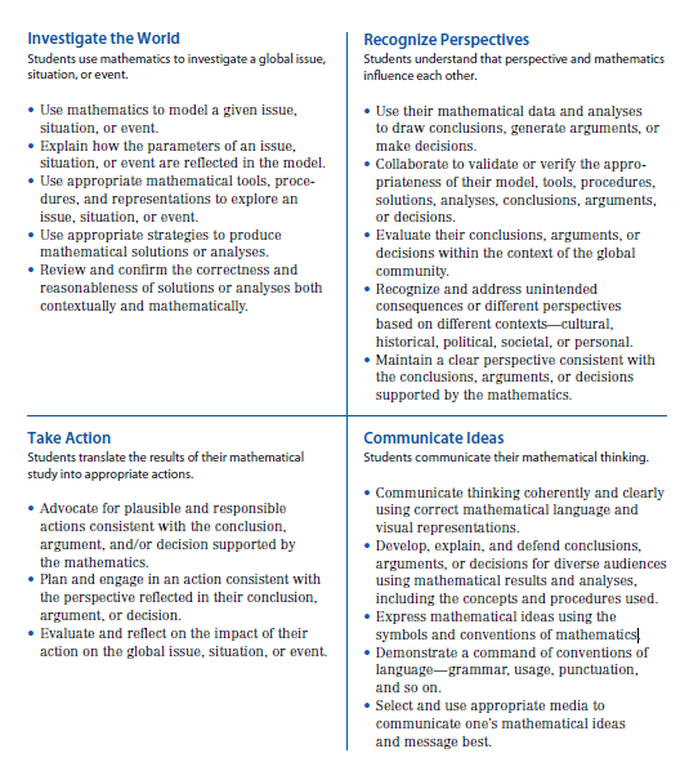Mathematics
The goal of an ISSN school mathematics program is to develop an individual’s capacity to understand the role of mathematics in the world; to study issues, situations, or events of global significance that call for a mathematical approach or solution, and to use mathematics to support conclusions, arguments, and decisions that lead them to act as reflective, constructive, and concerned citizens of the world.
This leads a teacher of mathematics to ask the question: What is the mathematics that students need to attain this goal? For example:
To be able to describe the mathematics that we need to study, it is important that we understand that the world consists of situations, events, and phenomena:
These domains of study constitute the basis of the mathematics program in an ISSN school. However, the right content is not enough; one must ensure that students have access to the appropriate experiences that will guide them in their use of the mathematics to study better and contribute to the world. To aid in this challenge, the GPS performance outcomes and rubric can serve as a focal point for organizing instructional experiences. The performance outcomes and rubric were developed to address the four expectations for any globally competent individual:
Within each of these expectations are specific skills, knowledge, and dispositions that will guide teachers in their decision-making for what should be taught and how it can be taught in a mathematics classroom focused on a global environment.
This leads a teacher of mathematics to ask the question: What is the mathematics that students need to attain this goal? For example:
- What is the mathematics our students need to understand the world better?
- What is the mathematics that students need to know in order to solve complex problems in a complex world?
- How do we organize the mathematics content in an ISSN school to support the goals and outcomes for a graduate of an ISSN school?
To be able to describe the mathematics that we need to study, it is important that we understand that the world consists of situations, events, and phenomena:
- that can be represented, described, or quantified, entailing a solid understanding of algebra and the mathematics of generalization;
- that involve relationships among quantities, necessitating an understanding of functions and analysis;
- that are often physical/spatial and have measurable attributes, requiring a background in geometry and geometric measurement; and
- that are often inherently variable and uncertain, requiring an understanding of probability and statistics.
These domains of study constitute the basis of the mathematics program in an ISSN school. However, the right content is not enough; one must ensure that students have access to the appropriate experiences that will guide them in their use of the mathematics to study better and contribute to the world. To aid in this challenge, the GPS performance outcomes and rubric can serve as a focal point for organizing instructional experiences. The performance outcomes and rubric were developed to address the four expectations for any globally competent individual:
- that they can investigate the world;
- that they can recognize perspectives;
- that they communicate ideas; and
- that they can take action.
Within each of these expectations are specific skills, knowledge, and dispositions that will guide teachers in their decision-making for what should be taught and how it can be taught in a mathematics classroom focused on a global environment.
The goal of an ISSN school mathematics program is to develop an individual’s capacity to understand the role of mathematics in the world; to study issues, situations, or events of global significance that call for a mathematical approach or solution, and to use mathematics to support conclusions, arguments, and decisions that lead them to act as reflective, constructive, and concerned citizens of the world.

